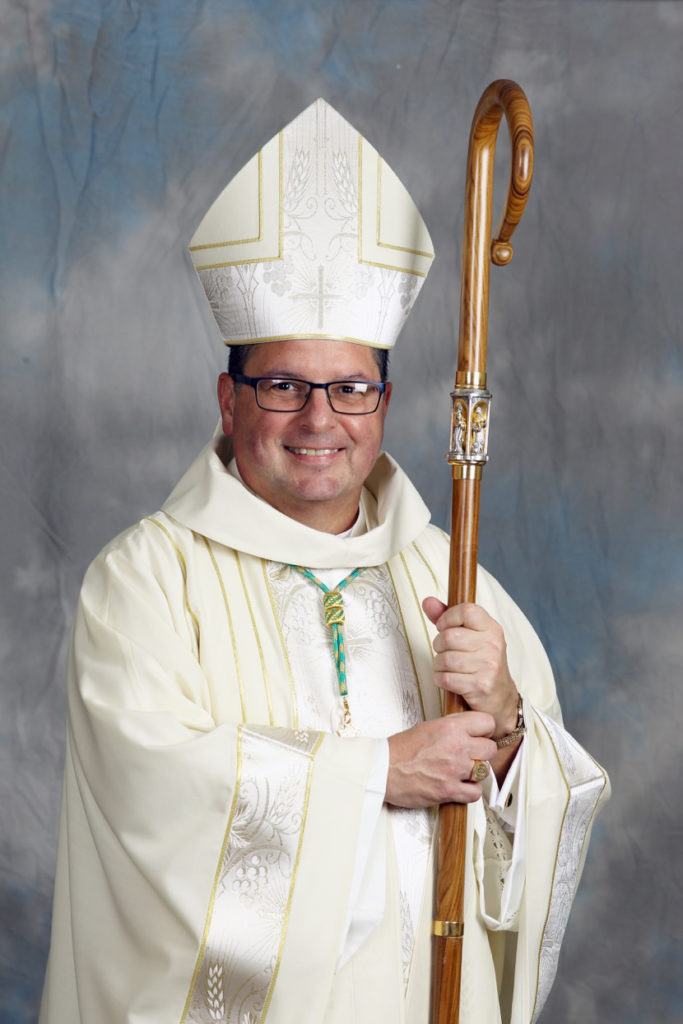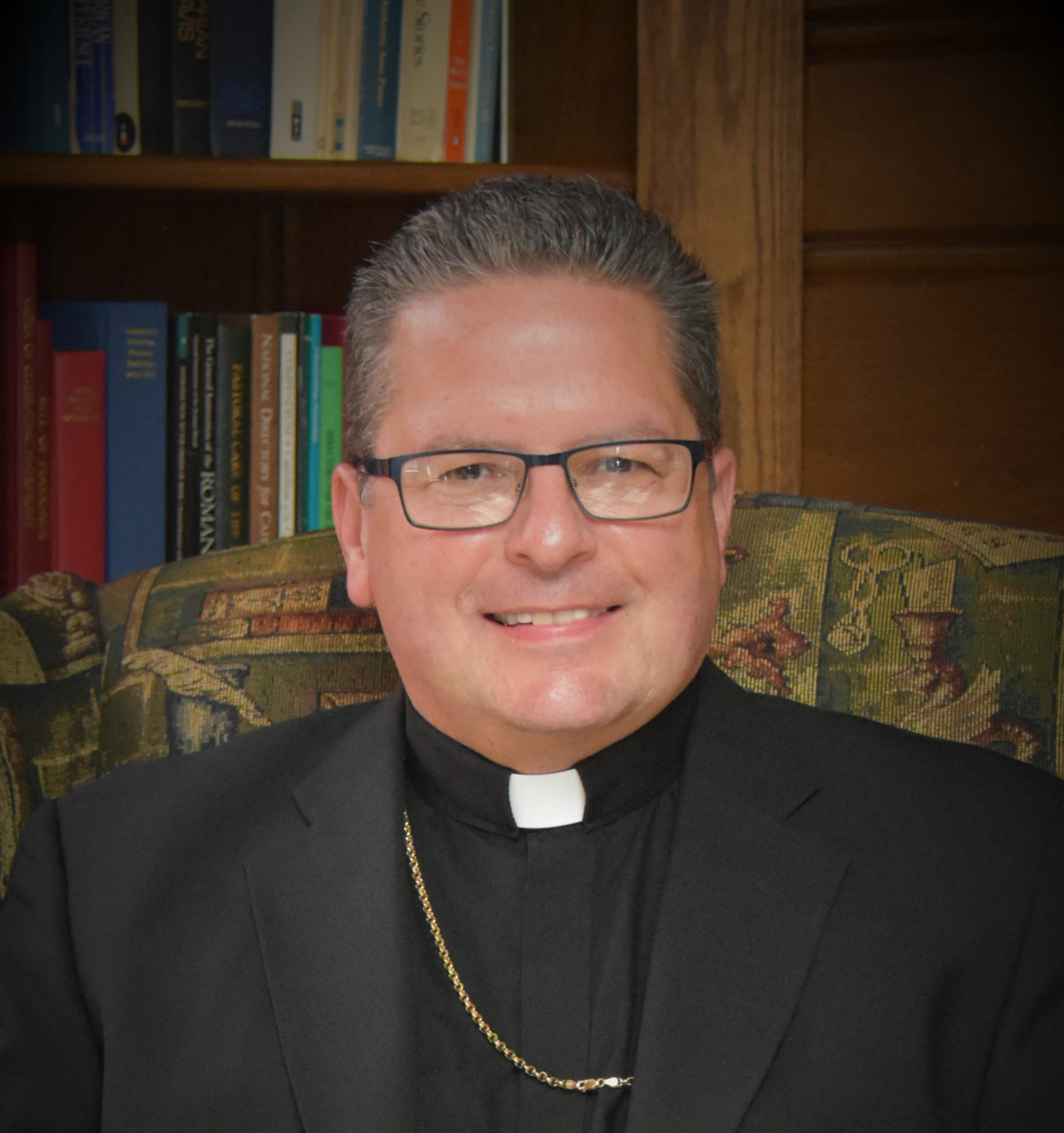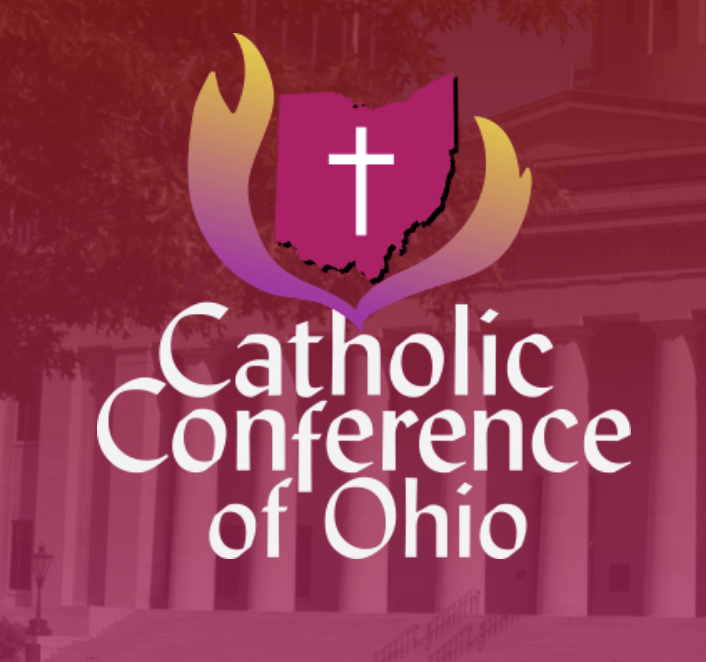MOST REV. DAVID J. BONNAR
Bishop of Youngstown
This is Bishop Bonnar’s homily for the June 5, 2022 ordination of four Diocese of Youngstown seminarians to the transitional diaconate. This homily was also published in the June 10, 2022 edition of The Catholic Exponent, the newspaper for the Diocese of Youngstown.
The video of the Mass, produced by CTNY, follows the homily.
In the early 1980s, the United States Navy came out with a slogan that was the centerpiece for their recruitment efforts. The slogan was: “Navy. It’s not just a job. It’s an adventure.” The government spent millions of dollars each year on this initiative which resulted in an uptick in recruiting numbers.
Anyone who works for the Church knows “It’s not just a job. It is an adventure.” We could easily add to this slogan by saying: “It’s a vocation. It’s a journey wrapped in mystery, drama, and surprise.”
We gather today in this cathedral for the ordination of four men – Brook Benedict, Bob England, John Rovnak, and Fritz Schlueter – all of whom desire to work for the Church. What a great day for the Church of Youngstown! The interview process is completed. They got the job – so to speak. Moments ago, these men showed up to work for the Church by saying “Present.” After entering this sacred ritual of ordination to the diaconate, these men will be sent forth with an assignment and become permanent workers for the Church. Gentlemen, I don’t know if Father Kopp had a discussion with you regarding the salary and benefits of working for the Church but let me just echo an adage: “Working for the Lord does not pay much, but the retirement plans are out of this world.”
Of course, you know by now, and accept this fact, that it is not about the pay or even the schedule because what you are embracing is not a job but a 24/7 vocation and way of life. In a few moments, you will publicly declare your resolve to undertake the office of deacon and be consecrated for the ministry of the Church through the laying on of my hands and the gift of the Holy Spirit.
In addition, you will resolve to live out with “humble charity” the office of the diaconate and assist the priestly order for the good of God’s people.
You will resolve to behold the mystery of faith with a clear conscience and proclaim this faith in word and deed in accord with the Gospel and the Church’s tradition.
You will resolve to embrace the celibate state “perpetually” for the sake of the Kingdom in service to God and others.
You will resolve to be a man of prayer for the Church promising to celebrate “faithfully” the Liturgy of the Hours with and for the People of God and the intentions of the entire world.
You will resolve to conform your manner of life to the example of Christ whose Body and Blood you will handle at the altar.
Finally, you will place your joined hands into my hands and promise obedience to me and my successors. Essentially, gentlemen, you are all promising to be a “company man” and place the needs of others before your own. I cannot begin to tell you how humbled and joyful I feel by your open surrender to God’s grace. Thank you for answering this call.
This journey, however, is not one you make alone. We behold, this day, the many men and women who have been part of your formation to this point – most notably your parents and family members.
The family remains the first Church and the seedbed of vocations. We also behold the parishes that nurtured and helped formed you, the faithful, clergy, and staff. We also behold the presence of the vocation directors, spiritual directors, formation advisors, seminary professors, priest supervisors, and parish staffs who have contributed to your formation.
And we appreciate so much the relationship we share with the Cleveland Diocese and St. Mary and St. Charles seminaries and rector, Father Mark Latcovich, and Bishop-elect Michael Woost and St. Vincent Seminary and rector, Father Ed Mazich. Let’s not forget Sacred Heart, Hales Corners, (Wisconsin) where Bob England spent some time in formation.
We owe all these people a debt of gratitude for their service to the Church in accompanying you and helping to form you. May that service and accompaniment continue as you become a permanent worker for the Church with the hope of one day becoming a priest of Jesus Christ.
The second reading today which you selected for this occasion from the First Letter of St. Peter offers some pastoral advice as you embrace this new life. The letter was written at a time when the organization of the Church was very basic. There is no mention of deacons nor of bishops. The only Church officials named are the elders. Nevertheless, today’s selection, in a certain sense, foreshadows some of the duties and responsibilities of a deacon. Among the duties mentioned in this selection are four that are relevant to the deacon.
The first duty of a deacon is PRAYER. As you embrace this new work and lifestyle, prayer must be the foundation of all that you are and aspire to do. Prayer is more than a function. It is a way of being in a relationship with God – Father, Son and Holy Spirit.
What is noteworthy about today is that you are not only promising to be a man of prayer but a man who prays for others. I pray that prayer can become for you all that it is meant to be – namely a place of strength, hope, and peace as well as a place where we demonstrate again and again our love for God and one another. There is an old saying: “Seven days without prayer makes one weak.” If you do not pray regularly, your ministry will be weak and shallow. Be sure to pray!
The second duty of a deacon is HOSPITALITY. Gentlemen, you are going to be not only a man of prayer but also a man of the Church. You will soon be a public person representing the Church. As a deacon, you will be called to open doors and invite people into not just the church building but a deeper relationship with God and the Church. You need to cultivate a missionary heart capable of going to the peripheries to invite others to embrace the joy of the Gospel. Of particular importance in this regard are the poor and disenfranchised. You may be the only voice they have. This sense of diaconal hospitality is best captured in what the Holy Father calls “the art of accompaniment” that invites us in his words “to remove one’s sandals before the sacred ground of another” and practice the art of listening.
True hospitality and accompaniment are never meant to be about judgment. In fact, Pope Francis states in “The Joy of the Gospel:” “One who accompanies others has to realize that each person’s situation before God and their life in grace are mysteries which no one can fully know from without. The Gospel tells us to correct others and to help them grow in the basis of the objective evil of their actions (cf. Matt 18:15), but without making judgments about their responsibility and culpability (cf. Matt 7:1; Luke 6:37). Someone good at such accompaniment does not give in to frustration or fears.” (“Joy of the Gospel,” #172)
The third duty of a deacon referenced in today’s selection from First Peter is PREACHING. As a deacon, you will have the faculty to preach the joy of the Gospel. One of the best definitions of preaching comes from Father Richard DeLillio who spoke to our priests in a workshop. He defined preaching as “removing the scales from people’s eyes so that they can see.”
This work can only be effective to the extent that the preacher seeks to have the scales removed from his eyes regularly. Moreover, Pope Francis states: “Whoever wants to preach must be the first to let the Word of God and become incarnate in his daily life.” (“Joy of the Gospel,” #150)
Gentlemen, today you are aspiring to become not only a man of prayer and a man of the Church but also a man of God’s Word. Behold that Word and keep that Word! Know that the ambo belongs to God. It is not meant to be a platform for entertainment or one’s personal agenda.
The fourth diaconal duty highlighted in today’s second reading is SERVICE. In this sacred ritual you are promising to become a man with a compassionate and servant’s heart who, like Christ, does not come to be served but to serve. Also, keep in mind that no servant can serve two masters.
Gentlemen, when it comes to service, there is no task too menial or too lowly for a deacon. While we often associate diaconal service as something that happens at the altar in assisting the priest, there is so much more in this regard beyond the altar. For example, the deacon’s life should reflect service as a minister of charity and justice for the poor and needy. As deacons, you men will live to serve and serve to live.
In an address to deacons and their families last year, Pope Francis said: “We are all called to lower ourselves, because Jesus stooped to us. He made himself the servant of all. If there is one great person in the Church, it is the one who makes him or herself the smallest and servant of all.”
Gentlemen, go forth and be great by being the least – the smallest and lowest of all. And remember, this service is incomplete without joy. And when you go out to meet the Lord on the last day, may we be able to hear Him say: “Well done, good and faithful servant. Enter into the joy of your Lord.”



